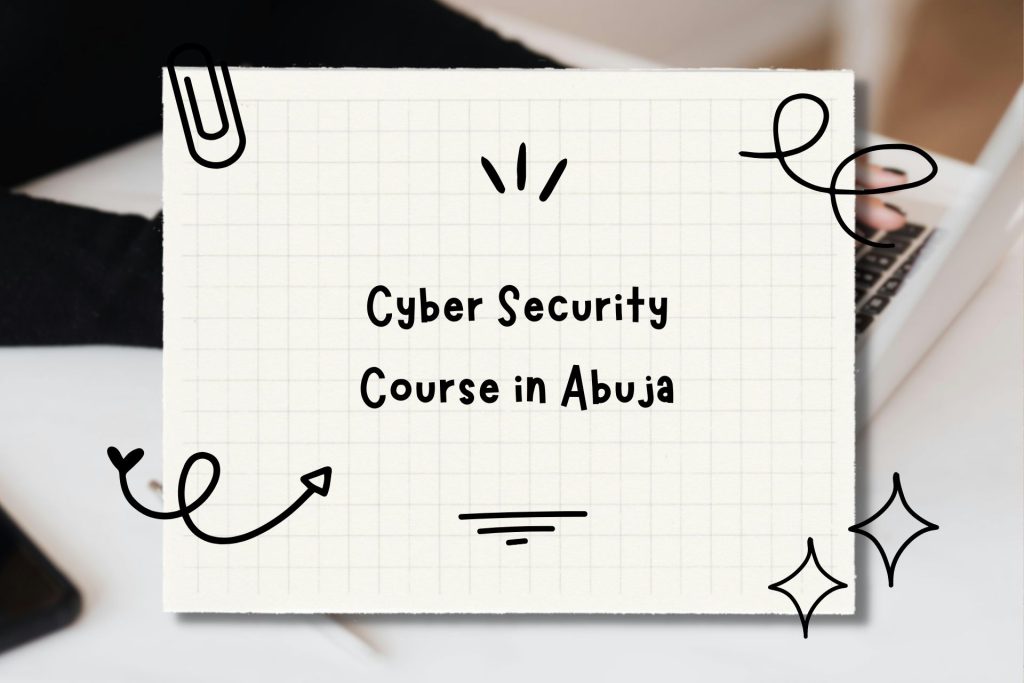Abuja, the capital city of Nigeria, is rapidly growing in the field of technology. With the increase in technology comes the increase in cyber threats.
Now, more than ever, the spotlight is on cybersecurity, and it’s a must for folks and businesses to gear up with the smarts and chops to shield their digital turf. And that’s where the Cybersecurity course in Abuja comes in.
The Cybersecurity course in Abuja is designed to provide individuals with the necessary knowledge and skills to protect their digital assets. The course covers network security, data protection, cryptography, and even ethical hacking – all served up by seasoned pros who’ve been around the cybersecurity block.
Whether you’re eyeing a career in cybersecurity or you’re a business looking to lock down your digital assets, this course has your back.
Upon completion of the course, you will have the knowledge and skills to protect your digital assets from cyber threats. Trust me, this is a valuable investment for anyone who wants to stay on top of the tech game and protect their digital assets from cyber threats.
Fundamentals of Cyber Security

Cybersecurity is the practice of protecting computer systems, networks, and data from digital attacks. It involves the use of technologies, processes, and policies to secure digital assets from unauthorized access, theft, or damage. A cyber security course in Abuja can provide students with the knowledge and skills necessary to protect computer systems and networks from cyber threats.
Recommended articles
Understanding Cyber Threats
To understand cyber threats, it is important to know the different types of attacks that can occur. The following are some common types of cyber threats:
- Malware: This is a type of software that is designed to harm computer systems or networks. Malware can be spread through email attachments, infected websites, or infected software.
- Phishing: This is a type of attack where an attacker tries to trick a user into giving away sensitive information such as login credentials or credit card numbers.
- Denial-of-Service (DoS) attacks: This is a type of attack where an attacker tries to overwhelm a computer system or network with traffic, making it unavailable to users.
- Man-in-the-Middle (MitM) attacks: This is a type of attack where an attacker intercepts communication between two parties and can potentially steal sensitive information.
Security Principles
There are several security principles that are essential to maintaining a secure digital environment. These principles include:
- Confidentiality: This principle ensures that sensitive information is only accessible to authorized individuals.
- Integrity: This principle ensures that data is accurate and has not been tampered with.
- Availability: This principle ensures that data and systems are available when needed.
- Authentication: This principle ensures that users are who they claim to be.
- Authorization: This principle ensures that users have the appropriate permissions to access certain data or systems.
Risk Management
Risk management is the process of identifying, assessing, and mitigating risks to a digital environment. This involves identifying potential threats, assessing the likelihood and impact of those threats, and implementing controls to reduce or eliminate the risks. Risk management is an ongoing process that requires continuous monitoring and updating to ensure that risks are effectively managed.
To wrap it up, getting a grip on the nuts and bolts of cyber security is essential for protecting computer systems and networks from cyber threats. By learning about different types of cyber threats, security principles, and risk management, individuals can better protect their digital assets from unauthorized access, theft, or damage.
Cyber Security Course in Abuja
- Certified Information Systems Security Professional (CISSP) Training
- Certified Ethical Hacker (CEH) Certification
- Certified Information Security Manager (CISM) Training
- CompTIA Security+ Certification
- Cisco Certified Network Associate (CCNA) Security
- Certified Cloud Security Professional (CCSP) Training
- Offensive Security Certified Professional (OSCP) Certification
- Certified Information Systems Auditor (CISA) Training
- Cybersecurity Risk Management Training
- Cybersecurity Fundamentals and Best Practices Workshop
Technical Skills Development
The Cybersecurity course in Abuja offers a comprehensive curriculum that aims to equip students with the necessary technical skills to protect digital assets and uncover vulnerabilities. The course is designed to provide hands-on experience and technical knowledge to combat various types of cyber threats.
Network Security
One of the key areas covered in the course is network security. Students will learn how to secure networks by implementing firewalls, intrusion detection and prevention systems, and other security measures. They will also learn about network protocols, such as TCP/IP, and how to detect and prevent network attacks, such as denial-of-service (DoS) attacks.
Application Security
Another important area covered in the course is application security. Students will learn how to secure applications by implementing secure coding practices and testing for vulnerabilities. They will also learn about common application vulnerabilities, such as SQL injection and cross-site scripting (XSS), and how to prevent them.
Incident Response
The course also covers incident response, which is the process of responding to a cyber attack. Students will learn how to detect and respond to security incidents, such as malware infections and data breaches. They will also learn about the legal and ethical considerations involved in incident response.
All in all, the Cybersecurity course in Abuja is like a launchpad for students to build up their technical prowess. When the course ends, students will be packing the smarts and skills needed to lock down digital assets and tackle cyber threats head-on.
Cyber Security Tools and Practices
Encryption and Access Control
One of the most essential tools in cybersecurity is encryption. Encryption is the process of converting plain text into a coded message to protect sensitive information from unauthorized access. In Abuja’s cybersecurity courses, students learn how to use encryption to secure data both at rest and in transit. They learn about various encryption methods such as symmetric and asymmetric encryption, and how to implement them in different scenarios.
Access control is another critical tool in cybersecurity. It helps to limit access to sensitive information to only authorized personnel. In Abuja’s cybersecurity courses, students learn how to implement access control measures such as passwords, biometrics, and multi-factor authentication to secure data access.
Security Information and Event Management (SIEM)
SIEM is a security management approach that provides real-time analysis of security alerts generated by network hardware and applications. It helps security professionals to identify and mitigate security threats before they cause significant damage. In Abuja’s cybersecurity courses, students learn how to use SIEM solutions to monitor and analyze security events, detect anomalies, and respond to security incidents.
Penetration Testing
Penetration testing is a simulated cyber attack on a computer system to identify vulnerabilities that can be exploited by a real attacker. It helps to identify weaknesses in the system and provides recommendations for improving security. In Abuja’s cybersecurity courses, students learn how to conduct penetration testing using various tools and techniques to identify vulnerabilities in computer systems and networks.
To sum it up, students learn how to use encryption and access control, implement SIEM solutions, and conduct penetration testing to secure computer systems and networks. With the increasing demand for cybersecurity professionals, these courses provide an excellent opportunity for individuals interested in pursuing a career in cybersecurity.
Regulatory Compliance and Ethics
As cyber threats continue to evolve, regulatory compliance and ethics are becoming increasingly important in the field of cybersecurity. Companies must comply with local and international laws to ensure that their data and their customers’ data are protected. In Abuja, there are several cybersecurity courses that cover regulatory compliance and ethics.
Global Cyber Security Laws
One of the most important aspects of regulatory compliance in cybersecurity is understanding global cyber security laws. The General Data Protection Regulation (GDPR) is a regulation in EU law on data protection and privacy for all individuals within the European Union (EU) and the European Economic Area (EEA). The GDPR has extraterritorial effect, which means that companies outside the EU must also comply with the regulation if they process personal data of EU residents. Other global cyber security laws include the California Consumer Privacy Act (CCPA) and the Australian Privacy Act.
Ethical Hacking
Ethical hacking is another important aspect of regulatory compliance and ethics. Ethical hacking is the practice of testing a computer system, network, or web application to find vulnerabilities that an attacker could exploit. Ethical hackers use the same methods and tools as malicious hackers, but they do so with the permission of the system owner. Ethical hacking is important because it helps companies identify vulnerabilities in their systems before they can be exploited by malicious hackers.
Data Protection Policies
Data protection policies are also an important aspect of regulatory compliance and ethics. Data protection policies outline how a company collects, uses, stores, and protects personal data. These policies must comply with local and international laws, such as the GDPR and the CCPA. Data protection policies should also outline how a company responds to data breaches and how it notifies affected individuals.
In conclusion, regulatory compliance and ethics are crucial aspects of cybersecurity. Companies must comply with local and international laws to protect their data and their customers’ data. Cybersecurity courses in Abuja cover regulatory compliance and ethics, including global cyber security laws, ethical hacking, and data protection policies.





